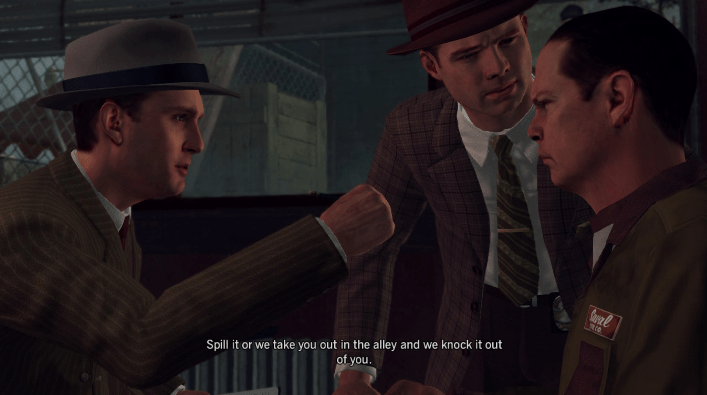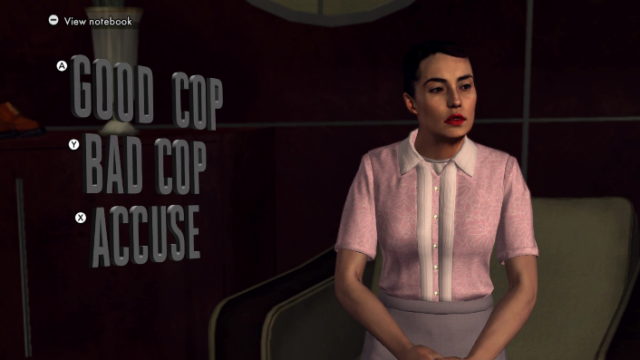L.A. Noire‘s remaster brings the cult detective story back for another round of sleuthing. A change to the dialog system meant to fix the original game’s flaws makes interrogations more difficult than before.
In L.A. Noire, Detective Cole Phelps investigates various crimes before getting swept up in a city-wide conspiracy. A major component of the game is interrogations. During cases, Cole can question witness and suspects, and players are meant to figure out if they are telling the truth thanks to advanced facial animation technology. In the original, you had three options for any statement. If you believed the subject, you could select “truth”. If you thought something was fishy, you could choose “doubt”. If you had evidence proving them wrong, you could select “lie”. These options were originally called “Coax”, “Force” and “Lie” before changing in development.
A major complaint about this system was how confusing it is, particularly the doubt option. Cole’s reaction when “doubt” was selected were often angry accusations and threats. To solve the difficulty in judging Cole’s tone, the remaster has renamed the three option to “Good Cop”, “Bad Cop” and “Accuse”. The aim is to provide clarity about how Cole will act.
Cole’s behaviour is still difficult to manage even within the new dialog system. Much of this has to do with the vagueness of what it means to “good cop” or “bad cop” someone. These terms encompass a wide range of possible actions. I might good cop someone by believing their story, but it could just as easily be said that I “good cop” simply through a congenial attitude. This also applies to bad cop. Am I threatening to arrest someone? Am I making a threat of physical violence? Am I just being grumpy? Hard to say.

While the original system of “Truth, Doubt, Lie” often failed to inform the player of how Cole would behave, it did let them know what action he’d accomplish. The doubt option fell prey to Cole’s mercurial dialog swings, but at least I know what it means to doubt someone. Having just played through L.A. Noire recently on Kotaku‘s Twitch channel, I can say that I found it much easier to guide Phelps in the original dialog system. Even if “doubt” sometimes has Cole yelling his head off, I know which way the conversation will flow from a gameplay perspective. If abbreviated options needed to remain for the remaster, selecting stronger verbs could have made a difference. “Believe, Doubt, Accuse” strikes me as a suitable alternative; they are all understandable verbs that communicate what the player will actually be doing. An even better change would have been to remove ambiguity entirely, allowing players to hover over a selection to see exactly what Cole will say next.
L.A. Noire is a genuine classic, even if it gets a little weird. Proper detective stories are a rare thing in video games, and while the original dialog system sometimes had Cole act like a jerk, the replacement turns interrogations into a genuine guessing game.

Comments
6 responses to “The L.A. Noire Remaster’s New Dialogue System Isn’t Specific Enough”
This is such a baffling design alteration that I’m honestly dumbfounded it was approved. It’s not like you’re working with a Mass Effect-esque Paragon/Renegade morality system in this game. The truth/doubt/lie mechanic is integral to how you manage your interrogations, and even though I agree it was poorly explained in the original release, renaming the options to good cop/bad cop while leaving the original dialogue system intact only further confounds this issue.
I really want to play this but i have autism, Without seeing what i’m about to say, I’m not able to comprehend the flow /Direction of the conversation & thus would find this very confusing, Fallout 4 was also problematic to a degree . I remember struggling alot with this & ended up quitting my playthrough when it originally came out.
This isn’t only a problem for people with autism, it’s a problem for everyone – “dialogue wheels” and systems where you can’t see exactly what you’ll actually say are universally confusing.
I get that game devs think millenials can’t or won’t read more than 5 words (for some reason) but is leaving everyone – even the people who actually care about your story – baffled actually a better option? …I’d say no, but I guess I’m in the minority, based on design trends.
Yes i agree, I always loved the Black Isle’s infinity engine games because you always knew what you were saying. We’re in the minority though as i have friends who loved Fallout 4’s dialogue wheel which also affected how the writers wrote the game to fit everything into the unnatural way of replying, In Fallout 4 you can’t get back to the start of a conversation to access other dialogue choices for example, You speak to a doctor & choose to get cured, You now have to end the conversation & restart it in order to barter with the said doctor, When you need to do this all the time, It becomes incredibly frustrating as it’s a dialogue system that has gone backwards in practicality.
How can this game be “..a genuine classic” if its primary selling point was a dud? It just didn’t work. It was SO annoying choosing an option that you thought would manifest as “be nice” but instead came out as “be a thundering asshole”.
I am hoping they patch it to add a “Use original dialogue choices” setting so you can use the good old Truth / Lie / Doubt options. 🙂
Even better if they change ‘doubt’ to ‘press’, as it was while the game was in development.